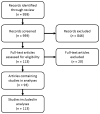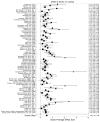The effects of acute stress on episodic memory: A meta-analysis and integrative review
- PMID: 28368148
- PMCID: PMC5436944
- DOI: 10.1037/bul0000100
The effects of acute stress on episodic memory: A meta-analysis and integrative review
Abstract
A growing body of research has indicated that acute stress can critically impact memory. However, there are a number of inconsistencies in the literature, and important questions remain regarding the conditions under which stress effects emerge as well as basic questions about how stress impacts different phases of memory. In this meta-analysis, we examined 113 independent studies in humans with 6,216 participants that explored effects of stress on encoding, postencoding, retrieval, or postreactivation phases of episodic memory. The results indicated that when stress occurred prior to or during encoding it impaired memory, unless both the delay between the stressor and encoding was very short and the study materials were directly related to the stressor, in which case stress improved encoding. In contrast, postencoding stress improved memory unless the stressor occurred in a different physical context than the study materials. When stress occurred just prior to or during retrieval, memory was impaired, and these effects were larger for emotionally valenced materials than neutral materials. Although stress consistently increased cortisol, the magnitude of the cortisol response was not related to the effects of stress on memory. Nonetheless, the effects of stress on memory were generally reduced in magnitude for women taking hormonal contraceptives. These analyses indicate that stress disrupts some episodic memory processes while enhancing others, and that the effects of stress are modulated by a number of critical factors. These results provide important constraints on current theories of stress and memory, and point to new questions for future research. (PsycINFO Database Record
(c) 2017 APA, all rights reserved).
Figures













Similar articles
-
True or false? Memory is differentially affected by stress-induced cortisol elevations and sympathetic activity at consolidation and retrieval.Psychoneuroendocrinology. 2008 Nov;33(10):1378-86. doi: 10.1016/j.psyneuen.2008.07.009. Epub 2008 Sep 13. Psychoneuroendocrinology. 2008. PMID: 18790572
-
Using acute stress to improve episodic memory: The critical role of contextual binding.Neurobiol Learn Mem. 2019 Feb;158:1-8. doi: 10.1016/j.nlm.2019.01.001. Epub 2019 Jan 2. Neurobiol Learn Mem. 2019. PMID: 30610919
-
Acute stress impairs memory retrieval independent of time of day.Psychoneuroendocrinology. 2011 May;36(4):495-501. doi: 10.1016/j.psyneuen.2010.08.001. Epub 2010 Aug 25. Psychoneuroendocrinology. 2011. PMID: 20800361 Clinical Trial.
-
Acute stress and episodic memory retrieval: neurobiological mechanisms and behavioral consequences.Ann N Y Acad Sci. 2016 Apr;1369(1):55-75. doi: 10.1111/nyas.12996. Epub 2016 Jan 21. Ann N Y Acad Sci. 2016. PMID: 26799371 Review.
-
The effects of post-encoding stress and glucocorticoids on episodic memory in humans and rodents.Brain Cogn. 2019 Jul;133:12-23. doi: 10.1016/j.bandc.2018.10.005. Epub 2018 Oct 26. Brain Cogn. 2019. PMID: 31178013 Free PMC article. Review.
Cited by
-
Registered nurse perceptions of factors contributing to the inconsistent brand image of the nursing profession.Nurs Outlook. 2020 Nov-Dec;68(6):808-821. doi: 10.1016/j.outlook.2020.06.005. Epub 2020 Aug 4. Nurs Outlook. 2020. PMID: 32763085 Free PMC article.
-
Incidence and risk factors of venous thromboembolism in kidney transplantation patients: a prospective cohort study.J Thromb Thrombolysis. 2024 Feb;57(2):278-284. doi: 10.1007/s11239-023-02911-w. Epub 2023 Nov 28. J Thromb Thrombolysis. 2024. PMID: 38017304
-
Acute Stress Attenuates Cognitive Flexibility in Males Only: An fNIRS Examination.Front Psychol. 2018 Nov 1;9:2084. doi: 10.3389/fpsyg.2018.02084. eCollection 2018. Front Psychol. 2018. PMID: 30443232 Free PMC article.
-
Tag and capture: how salient experiences target and rescue nearby events in memory.Trends Cogn Sci. 2022 Sep;26(9):782-795. doi: 10.1016/j.tics.2022.06.009. Epub 2022 Jul 13. Trends Cogn Sci. 2022. PMID: 35842373 Free PMC article. Review.
-
Persistent Neurological, Dissociative, and Amnestic Symptoms Following a Mild Traumatic Brain Injury in an Adolescent: A Complex Case of Conversion Disorder.Cureus. 2023 Jul 31;15(7):e42755. doi: 10.7759/cureus.42755. eCollection 2023 Jul. Cureus. 2023. PMID: 37654954 Free PMC article.
References
Studies Included in Meta-Analysis
-
- Almela M, Hidalgo V, Villada C, Espín L, Gómez-Amor J, Salvador A. The impact of cortisol reactivity to acute stress on memory: Sex differences in middle-aged people. Stress. 2011;14:117–127. http://dx.doi.org/10.3109/10253890.2010.514671. - DOI - PubMed
-
- Andreano JM, Arjomandi H, Cahill L. Menstrual cycle modulation of the relationship between cortisol and long-term memory. Psychoneuroendocrinology. 2008;33:874–882. http://dx.doi.org/10.1016/j.psyneuen.2008.03.009. - DOI - PubMed
-
- Andreano JM, Cahill L. Glucocorticoid release and memory consolidation in men and women. Psychological Science. 2006;17:466–470. http://dx.doi.org/10.1111/j.1467-9280.2006.01729.x. - DOI - PubMed
-
- Andreano J, Waisman J, Donley L, Cahill L. Effects of breast cancer treatment on the hormonal and cognitive consequences of acute stress. Psycho-Oncology. 2012;21:1091–1098. http://dx.doi.org/10.1002/pon.2006. - DOI - PubMed
-
- Azimi Z, Bakhshipour-Roudsari A. The impairing role of stress on autobiographical memory reconsolidation. Zahedan Journal of Research in Medical Sciences. 2012;14:51–55. Retrieved from http://www.zjrms.ir/article-1-2007-en.html.
References
-
- Ackermann S, Spalek K, Rasch B, Gschwind L, Coynel D, Fastenrath M, … de Quervain DJ-F. Testosterone levels in healthy men are related to amygdala reactivity and memory performance. Psychoneuroendocrinology. 2012;37:1417–1424. http://dx.doi.org/10.1016/j.psyneuen.2012.01.008. - DOI - PubMed
-
- Akirav I, Richter-Levin G. Biphasic modulation of hippocampal plasticity by behavioral stress and basolateral amygdala stimulation in the rat. The Journal of Neuroscience. 1999;19:10530–10535. Retrieved from http://www.ncbi.nlm.nih.gov/pubmed/10575049. - PMC - PubMed
-
- Akirav I, Richter-Levin G. Mechanisms of amygdala modulation of hippocampal plasticity. The Journal of Neuroscience. 2002;22:9912–9921. Retrieved from http://www.ncbi.nlm.nih.gov/pubmed/12427848. - PMC - PubMed
-
- Alexander JK, Hillier A, Smith RM, Tivarus ME, Beversdorf DQ. Beta-adrenergic modulation of cognitive flexibility during stress. Journal of Cognitive Neuroscience. 2007;19:468–478. http://dx.doi.org/10.1162/jocn.2007.19.3.468. - DOI - PubMed
-
- Allen AP, Kennedy PJ, Cryan JF, Dinan TG, Clarke G. Biological and psychological markers of stress in humans: Focus on the Trier Social Stress Test. Neuroscience and Biobehavioral Reviews. 2014;38:94–124. http://dx.doi.org/10.1016/j.neubiorev.2013.11.005. - DOI - PubMed
Publication types
MeSH terms
Substances
Grants and funding
LinkOut - more resources
Full Text Sources
Other Literature Sources
Medical

